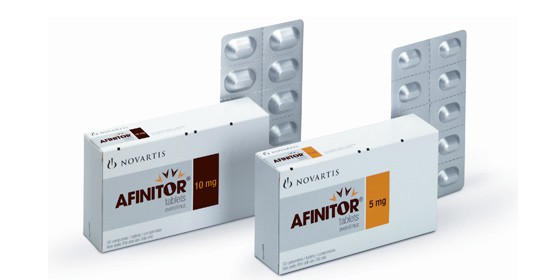
Novartis’ cancer therapy Afinitor has shown efficacy in a trial involving patients with neuroendocrine tumours (NET), setting up additional regulatory filings for the fast-growing drug.
Along with earlier approvals in breast and renal cancer, Afinitor (everolimus) is already licensed to treat NET originating in the pancreas, but the new RADIANT-4 study shows it is also effective when those tumours occur in the gastrointestinal system or lungs.
The phase III trial involved patients with so-called non-functional NET – in other words those that do not secrete hormones or other factors – a group with limited treatment options at present.
While functional NET cause symptoms that can give an early warning of the cancer’s presence, non-functional tumours are harder to spot so are often diagnosed only when the disease has spread to other parts of the body.
RADIANT-4 showed that Afinitor extended progression-free survival (PFS) compared to placebo when added to best supportive care for patients with advanced GI or lung NET, said Novartis, which plans to present the data in more detail at a forthcoming medical congress.
Novartis said Afinitor has the potential to become an “important treatment option” for NET originating in the GI tract and lung, and will be submitted for approval on the basis of the new data later this year.
Afinitor is one of the main drivers in Novartis’ oncology division at the moment, with first quarter sales rising 18% to $388m thanks to increased take-up in HER2-negative breast cancer, although efforts by the company to expand its use into HER2-positive breast cancer and liver cancer proved unsuccessful.
The failures have trimmed back peak sales forecasts for Afinitor – once put as high as $3.5bn – amid recognition that it will become harder to advance the drug in earlier-stage cancer patients.
Novartis chief executive Joe Jimenez old analysts on the company’s first-quarter results call that even in breast cancer newer therapies such as Pfizer’s CDK 4/6 inhibitor Ibrance (palbociclib) are likely to push Afinitor into later use, although he said most patients will still end up using the drug.
The company’s strategy going forward is to follow-up Afinitor with its candidate PI3 kinase inhibitors BYL719 and buparlisib (BKM120) – currently in mad-stage trials for a range of cancers – as well as its CDK 4/6 inhibitor candidate LEE011 which is in phase III.




